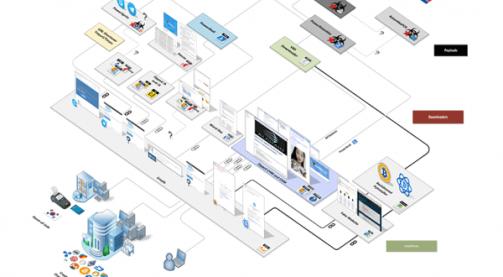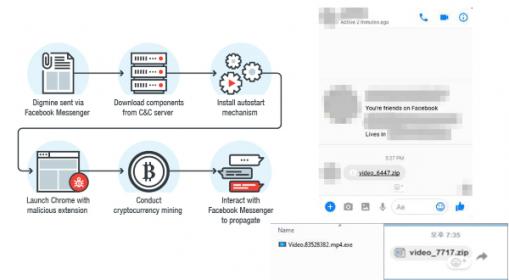As predicted, the rise of cryptocurrency valuation has captured the attention of cybercriminals. New hacks, thefts, misuse, and fraud schemes are on the rise. Where there is value, there will be a proportional risk of theft.Criminals always pursue and exploit systems where they can achieve personal financial gain. It is the Willie Sutton effect: “That’s where the money is”.
This month we have seen a number of different cryptocurrency related malicious activities targeting customers and companies. Unsuspecting people’s computers and phones have been hijacked by attackers to mine cryptocoins, malware that targets crypto-keys is on the rise, fake Bitcoin wallet apps are appearing in App Stores, and a Bitcoin exchange was permanently shut down due to multiple hacks.
The creativity and persistence of cybercriminals is impressive and only likely to increase over time.
Greedy North Korean Hackers Targeting Cryptocurrencies and Point-of-Sale Terminals

Comment: What is believed to be nation-state malware, is installing a Remote Access Trojan (RAT) that enables the theft of cryptocurrency credentials of users and exchanges. Whomever is behind this malware is interested, among other things, harvesting valuable digital currency. Financial gain is a tremendous motivation for so many different cyber threats, potentially even nation run cyber-criminal programs!
Hackers Targeting Servers Running Database Services for Mining Cryptocurrency

Comment: Sophisticated hackers are also targeting beefy database servers to harvest data, install cryptocoin mining software, Remote Access Trojans (RAT), botnet control functions, and likely to use them as a launching pad to propagate attacks against systems connecting to the database.
Starbucks Wi-Fi hijacked customers’ laptops to mine cryptocoins

Comment: Want crypto-coin stealing malware with your coffee? Another free-WiFi risk to add to the bonfire. CoinHive, a JavaScript miner, infected users at a Starbucks to use customer’s laptops to mine cryptocoin for the attackers.
Cryptocurrency Mining Scripts Now Run Even After You Close Your Browser

Comment: Websites can harvest the power of visitor’s systems to mine for cryptocurrency. Working through the web browsers, JavaScript code running the background can tap into PC resources to use CPU cycles to mine for crypto coins. This can happen openly or covertly. Some sites are using this to supplement regular advertising. Some sites are being hacked and inadvertently supporting cybercriminals. One disturbing advancement is that the process can continue to run in the background even after navigating away from the site or closing the browser window.
Bitcoin Exchange Shuts Down After Getting Hacked a Second Time This Year

Comment: Cybersec Lesson #42: If you can’t protect your digital assets from cyber-threats, it can cost you the business. This cryptocurrency exchange is filing bankruptcy and closing. It cites the two hacks which drained significant assets as the cause.
Massive Brute-Force Attack Infects WordPress Sites with Monero Miners

Comment: The WordPress community has been a favorite target of hackers for some time. The latest attack involves hackers using brute-force techniques to gain administrative access to websites then installing crypto mining malware. This has turned a profit for the criminals to the tune of more than $100 thousand dollars. With that type of reward, don’t expect this tactic to end anytime soon.
Beware of Cryptocurrency Mining Virus Spreading Through Facebook Messenger

Comment: Beware, a new cryptocurrency mining-bot is making the rounds through Facebook Messenger. The malware allows attackers to siphon CPU cycles from the victim as part of a cryptocoin mining scheme. As a bonus, it then hijacks their Facebook account to send itself to the victims’ friends.
Google Removes Three Fake Bitcoin Wallet Apps From Google Play

Comment:We will see more of these c. App Stores need to pay extra care in vetting crypto wallet apps. Much thanks to the Lookout security team for spotting these and Google for quickly removing them from the App Store.
Image Sources:
- https://thehackernews.com/2017/12/lazarus-hacking-bitcoin.html
- https://thehackernews.com/2017/12/chinese-hacking-databases.html
- https://nakedsecurity.sophos.com/2017/12/14/starbucks-wi-fi-hijacked-customers-laptops-to-mine-cryptocurrency/
- https://thehackernews.com/2017/11/cryptocurrency-mining-javascript.html
- https://www.bleepingcomputer.com/news/security/bitcoin-exchange-shuts-down-after-getting-hacked-a-second-time-this-year/
- https://www.bleepingcomputer.com/news/security/massive-brute-force-attack-infects-wordpress-sites-with-monero-miners/
- http://blog.trendmicro.com/trendlabs-security-intelligence/digmine-cryptocurrency-miner-spreading-via-facebook-messenger/
- http://www.eweek.com/security/google-removes-three-fake-bitcoin-wallet-apps-from-google-play
Interested in more? Follow me on your favorite social sites for insights and what is going on in cybersecurity: LinkedIn, Twitter (@Matt_Rosenquist), YouTube, Information Security Strategy blog, Medium, and Steemit
Also read:Why Bitcoin is the largest Ponzi scheme in human history
Share this post via:






Semidynamics Unveils 3nm AI Inference Silicon and Full-Stack Systems